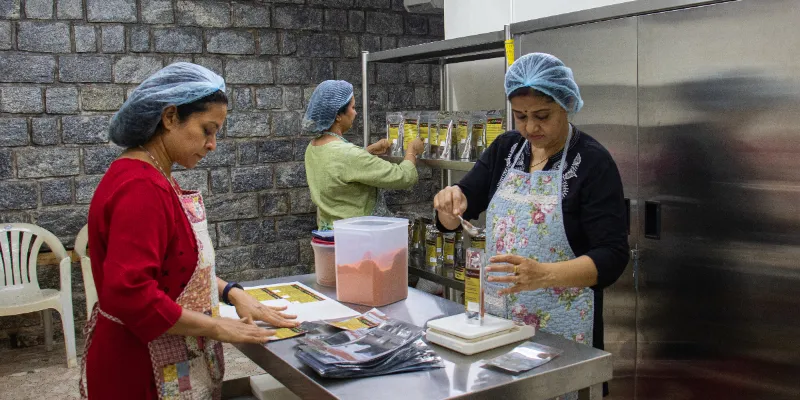Meet the three women who launched an instant, healthy foods brand and grew business amid COVID-19
Three women from Bangalore's Sarjapur Road decided to turn their passion for cooking into an entrepreneurial endeavour when they realised the need for authentic, healthy food products.
The expression on actor Sridevi’s face when her English teacher calls her character, homemaker Shashi, an ‘entrepreneur’ in English Vinglish stayed with us long after the movie ended. But there are thousands of Shashis across India, cooking up amazing products and entrepreneurship stories in their kitchens.
Bangalore-based Geetha Nagesharao Kupparavalli (48), Rajeswari Ramnath aka Usha (54), and Roopa Adiga (42) are among them. The three women – “natural product enthusiasts” – came together in February 2020 to launch an FMCG small business.
GRUhasutram provides a range of products, including breakfast mixes, meals and curries, spices, hair care products, oils and more.
The ‘GRU’ of GRUhasutram is derived from the initials of the three co-founders. The three friends would often meet for get-togethers and on other occasions. Roopa was a home-maker, while Usha and Geetha had some experience in the corporate and entrepreneurial spaces respectively.
The trio shared a common passion for cooking, and during one meeting realised that their college-going children based outside of Bengaluru were missing home-cooked meals and were not happy with options available in the market.
“When we gave our children packaged food, the authentic taste was missing. This compelled us to spring into action,” Usha says.
Research showed them that this was a problem in Bangalore, considered the Silicon Valley of India where numerous youth come from different parts of the country to find their place in the tech world.
Usha, who quit her job in 2019, got Geetha and Roopa onboard and they invested Rs 3 lakh each to launch the FMCG company.

Selling its products may not have been that difficult, but operating amid a global pandemic with severe restrictions and lockdowns was challenging, the trio highlight.
Operating amid COVID-19
The demand for FMCG products, especially ready-to-eat foods, grew exponentially during the COVID-19 pandemic. According to a report by ResearchAndMarkets, the Indian ready-to-eat food market is projected to grow at a CAGR of more than 16 percent during 2018-2023 to reach $647 million by 2023.
In that sense, companies like GRUhasutram were primed for the pandemic.
“The pandemic was making it difficult for women to concentrate on work as well as the home so we thought why not make it easier for them when it came to cooking?” Roopa says.
GRUhasutram rolled out a series of spices and breakfast mixes such as rava dosa and rava idli in the initial days of starting. “These instant mixes were not only helpful to women but also men who could easily cook using them,” Geetha says.
Selling its products may not have been that difficult, but operating amid a global pandemic with severe restrictions and lockdowns was challenging.
“We wanted to set up stalls in apartments to distribute samples but were unable to do so,” Roopa says. Geetha and Usha add that several palnned marketing activities were curtailed because of the circumstances. To make up for that and get greater traction, the co-founders started sending free samples with orders they received.
To ensure safety, the three women did all the work on their own and didn’t hire any workforce in the initial months.
Over time, word of mouth and distributing free samples worked wonders for this small business.
GRUhasutram, which started by getting orders from one locality in Sarjapur Road in Bangalore, gradually spread to other parts of the city and then the country. A website ensured that the company now gets orders from various places including Delhi, Chandigarh, Mumbai, Hyderabad, Kolkata, and more.
Usha says they onboarded a few men who had lost their jobs during the pandemic to help them with local deliveries. The brand has now tied with Shiprocket for pan-India deliveries.
Focus on quality
The GRUhasutram production unit is situated in a small basement on Sarjapur Road. Raw materials are procured from different places such as Kurk, Neyveli and more.
Roopa says the idea of GRUhasutram is to provide authentic and healthy food and other products. “Initially, raw materials procurement was very difficult because there are a lot of adulterated products in the market,” Geetha says.
The founders decided to source raw materials from small farmers or buy from shops where they were confident of the quality. “This helped in maintaining consistency and quality of the products.”
GRUhasutram is yet to report a breakthrough in terms of revenue numbers. However, the women reveal that it serves close to 1,500 customers a month, 60-70 percent of which are repeat customers, along with selling more than 350 units on a monthly basis.
Going forward, GRUhasutram plans to get listed on marketplaces such as BigBasket, Amazon, and more, and discussions are on. In terms of product lines, the team plans to “introduce immunity bars as well as chemical-free body massage oils in the next few months”.
YourStory’s flagship startup-tech and leadership conference will return virtually for its 13th edition on October 25-30, 2021. Sign up for updates on TechSparks or to express your interest in partnerships and speaker opportunities here.
For more on TechSparks 2021, click here.
Applications are now open for Tech30 2021, a list of 30 most promising tech startups from India. Apply or nominate an early-stage startup to become a Tech30 2021 startup here.
Edited by Teja Lele









